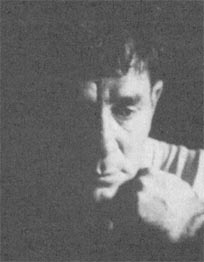Jack Kerouac
 Jack (Jean-Louis) Kerouac was born March 12, 1922 in Lowell, Massachusetts USA. He was a novelist and spokesman of the
"Beat" movement. Kerouac gave the Beat movement its name and celebrated its code of poverty and freedom in a series of novels of which the first and best known is On the Road
(1957).
Jack (Jean-Louis) Kerouac was born March 12, 1922 in Lowell, Massachusetts USA. He was a novelist and spokesman of the
"Beat" movement. Kerouac gave the Beat movement its name and celebrated its code of poverty and freedom in a series of novels of which the first and best known is On the Road
(1957).
Of French-Canadian descent, Kerouac learned English as a second language as a schoolboy. Discharged from the Navy during World War II as a schizoid personality, he served as a merchant seaman. Thereafter he roamed the United States and Mexico, working at a variety of jobs that included railroad man and forest ranger, before he published his first novel, The Town and the City (1950). Dissatisfied with fictional conventions, however, Kerouac developed a new, spontaneous, nonstop, unedited method of writing that shocked more polished writers. On the Road, written in three weeks, was the first product of the new style. A formless book, it deals with a number of frenetic trips back and forth across the country by a number of penniless young people who are in love with life, beauty, jazz, sex, drugs, speed, and mysticism but have absolute contempt for alarm clocks, timetables, road maps, mortgages, pensions, and all traditional American rewards for industry.
The book drew the attention of the public to a widespread subterranean culture of poets, folksingers, hipsters, mystics, and eccentrics, including the writers Allen Ginsberg, Gregory Corso, William Burroughs, John Clellon Holmes, Peter Orlovsky, Gary Snyder, and Philip Whalen, all important contributors to the Beat movement. All of Kerouac's works, including The Dharma Bums (1958), The Subterraneans (1958), Doctor Sax (1959), Lonesome Traveler (1960), and Desolation Angels (1965), are autobiographical, and most of them feature other prominent Beat writers as characters. The posthumously published Visions of Cody (1972) was originally a part of On the Road.
 By 1950 Kerouac had begun reading Buddhist texts, in reaction to Neal Cassady, who was involved with Edgar Cayce, a sort of
"channeling" specialist somewhat famous in those years. Kerouac thought this was a crude provincial American "Billy Sunday in a suit," so he went back to more original texts
relating to metempsychosis and reincarnation.
By 1950 Kerouac had begun reading Buddhist texts, in reaction to Neal Cassady, who was involved with Edgar Cayce, a sort of
"channeling" specialist somewhat famous in those years. Kerouac thought this was a crude provincial American "Billy Sunday in a suit," so he went back to more original texts
relating to metempsychosis and reincarnation.
Kerouac who was the most successful "Beat" author distanced himself further from the other "beats" as he increased his drunkeness and moved further into right wing political attitudes, anti-semitism and anger. His most famous (and probably only still read book), 'On The Road' which will always find an audience amongst disaffected teenagers, is a peaen to the peripatetic life, with warm but stormy relationships and a deep social disillusionment assuaged by drugs, alcohol, mysticism, and biting humor. A life he had very little connection with after the early years. He lived with and was supported by his mother for nearly all his life.
He died on October 21st 1969, in St. Petersburg, Florida.
Bibliography:
- The Holy Goof A biograpy of Neal Cassady
William Plummer - Off The Road with Kerouac & Cassaday
Carolyn Cassidy
By wife of Cassady - The Beats
Ann Charters - The Birth of the Beat Generation
Steven Watson
Good short introduction, with plenty of pictures for the non-literate. - Ginsberg A Biography
Barry Miles
Hagiography by a long time Ginsberg associate that doesn't attempt to sanitise his picture of Ginsberg for the "squares" too much. - Dharma Lion A Critical Biography
Michael Schumacher
It's unlikely that anybody naming a book about Ginsberg 'Dharma Lion' would be capable of critical thinking about him and Schumacher certainly proves this point. A lot more detailed than Miles' biography and somewhat more sanitised also, twice the words and half the drugs and sex of Mile's book.
Back to Gurus Page.